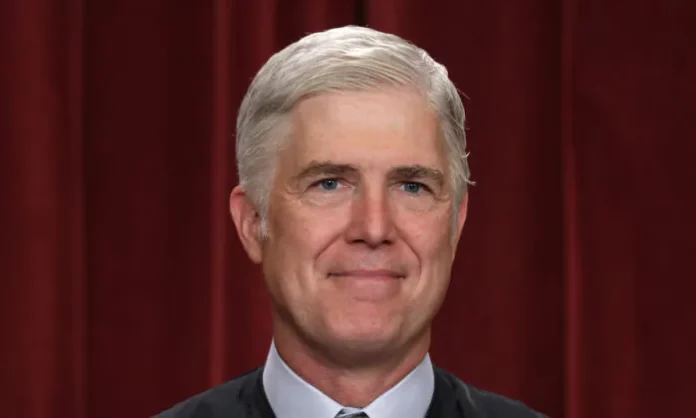Submitted by The Honourable A. Brian Peckford
The justice opined in a heavy reflection as the high court dismissed a suit seeking to keep Title 42
By Gary Bai
May 20, 2023
Supreme Court Justice Neil Gorsuch on Thursday lamented what he calls an intrusion into civil liberties by pandemic emergency decrees since the start of COVID-19 as the high court dismissed a suit on Title 42 as moot.
“Since March 2020, we may have experienced the greatest intrusions on civil liberties in the peacetime history of this country,” Gorsuch, one of six conservative-leaning Supreme Court justices, said in an opinion accompanying the court’s decision (pdf) published on Thursday.
Gorsuch wrote that emergency decrees ordering vaccine mandates and lockdowns issued by federal and state executive agencies resulted in an accumulation of power in those agencies and accompanied this loss of liberties during the pandemic. This view, some experts say, shines a light on the high court’s vision of restoring a balance of power in the federal government to that more aligned with America’s founders.
“The concentration of power in the hands of so few may be efficient and sometimes popular. But it does not tend toward sound government,” the justice wrote. “However wise one person or his advisors may be, that is no substitute for the wisdom of the whole of the American people that can be tapped in the legislative process.”
Gorsuch’s warning came as the Supreme Court dismissed a case brought by Republican attorney generals to keep in place Title 42, the emergency measure that the Trump administration implemented in March 2020 as a reaction to the COVID-19 pandemic. Both Trump and Biden administrations used Title 42 to expel illegal immigrants.
While the state’s case hinges on the more technical question of whether they can intervene in a case in another state to keep Title 42 in place, Gorsuch’s opinion indicated that the high court believed this question is no longer relevant as the public health emergency—to which Title 42 was designed as a reaction—ended in April.
Technicalities aside, Gorsuch took the opportunity to reflect on the bigger picture: namely, what he sees as a threat to civil liberties during the COVID pandemic when “executive officials across the country issued emergency decrees on a breathtaking scale.”
Loss of Civil Liberties
The Title 42 case brought by the states illustrates this threat to civil liberties, Gorsuch, a Trump appointee, wrote in his Thursday opinion.
He acknowledged that the surging illegal immigration across the border is a “crisis,” and so was COVID. But he warned that “the current border crisis is not a COVID crisis,” and the fact that the executive branch used the pandemic as the pretext to deal with another crisis at the border is emblematic of the broader, fear-driven response from U.S. institutions that may have led to “the loss of many cherished civil liberties” during COVID.
“Executive officials across the country issued emergency decrees on a breathtaking scale. Governors and local leaders imposed lockdown orders forcing people to remain in their homes. They shuttered businesses and schools, public and private. They closed churches even as they allowed casinos and other favored businesses to carry on,” the justice said, adding that violators were threatened with criminal sanctions and federal officials pressured social media companies into suppressing views they disagree with.
“They used a workplace-safety agency to issue a vaccination mandate for most working Americans. They threatened to fire noncompliant employees and warned that service members who refused to vaccinate might face dishonorable discharge and confinement,” he wrote.
Gorsuch also noted the apparent inaction of the legislative branch—state legislatures and Congress—in response to these executive decrees and how the judicial branch, which was “bound to protect our liberties addressed a few—but hardly all—of the intrusions upon them.”
“In some cases, like this one, courts even allowed themselves to be used to perpetuate emergency public-health decrees for collateral purposes, itself a form of emergency-lawmaking-by-
The conservative justice warned that an important lesson from the pandemic is that “fear and the desire for safety are powerful forces,” and, citing Aristotle, noted that “even the ancients warned that democracies can degenerate toward autocracy in the face of fear.”
“Make no mistake—decisive executive action is sometimes necessary and appropriate,” he added. “
“But if emergency decrees promise to solve some problems, they threaten to generate others.
“And rule by indefinite emergency edict risks leaving all of us with a shell of a democracy and civil liberties just as hollow.”
A Need for Reflection
H. Jefferson Powell, a prominent constitutional scholar who teaches law at Duke Law School, echoed Gorsuch’s view that the country should reflect on what the government did in response to Covid via emergency powers.
He quoted an opinion of Supreme Court Justice Robert Jackson in the landmark Steel Seizure Case, that the founders “suspected that emergency powers would tend to kindle emergencies.”
Read More HERE:


